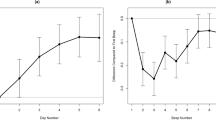Abstract
Background and aims: The present study examines the usefulness of a newly developed instrument, the Martin and Park Environmental Demands (MPED) Questionnaire, to measure the level of self-reported environmental demands of day-to-day events faced by adults aged 35 to 84 years, particularly as these demands influence forgetfulness in taking medications. Methods: The MPED has two scales including Busyness, which addresses the density or pace of daily events to which an individual attends; and Routine, addressing the predictability or routinization of events independent of density. The MPED was administered to a sample of 121 rheumatoid arthritis patients, along with a baseline assessment battery measuring age, education, employment status, household size and other factors that might influence self-perception of Busyness and Routine. Results: The scale showed good internal consistency and external validity. Higher levels of environmental demand were negatively correlated with age and positively correlated with employment, household size and medication-taking errors. There was a significant independent association between Busyness and adherence errors even after controlling for the effects of these sociodemographic variables. Conclusions: The MPED is recommended when trying to assess the general daily level of environmental demands.
Similar content being viewed by others
References
Schooler C, Schaie KW. Cognitive functioning and social structure over the life course. Norwood, NJ: Ablex, 1987.
Hultsch DF, Hammer M, Small BJ. Age differences in cognitive performance in later life: Relationships to self-reported health and activity life style. J Gerontol 1993; 48: 1–11.
Schooler C. The workplace environment: Measurement, psychological effects, and basic issues. In Friedman SL, Wachs TD, Eds. Measuring environment across the life span. Washington. DC: APA, 1999: 229–48.
Willis SL. Towards an educational psychology of the older adult learner: Intellectual and cognitive bases. In Birren JE, Schaie KW, Eds. Handbook of the psychology of aging. 2nd ed. New York: Van Nostrand Reinhold. 1985: 818–47.
Park DC, Gutchess AH. Cognitive aging and everyday life. In Park DC, Schwarz N. Eds. Cognitive aging: A primer. Philadelphia. PA: Psychology Press, 2000: 217–32.
Park DC, Hertzog C, Leventhal H, et al. Medication adherence in rheumatoid arthritis patients: Older is wiser. J Am Geriatr Soc 1999; 47: 172–83.
Gribbin K, Schaie KW, Parham IA. Complexity of life style and maintenance of intellectual abilities. J Soc Iss 1980; 36: 47–61.
Schaie KW, Gribbin K. Einflüsse der aktuellen Umwelt auf die Persönlichkeitsentwicklung im Erwachsenenalter [Environmental influences on personality in adulthood]. Z Entwicklungspsychol Pad Psychol 1975; 7: 233–46.
Glass TA, Kasl SV, Berkman LF. Stressful life events and depressive symptoms among the elderly. J Aging Health 1997; 9: 70–89.
Orrell MW. Davies ADM. Life events in the elderly. Int Rev Psychiatry 1994; 6: 59–71.
Almeida DM, Kessler RC. Everyday Stressors and gender differences in daily distress. J Person Soc Psychol 1998; 75: 670–80.
Lu L. Daily hassles and mental health: A longitudinal study. Br J Psychol 1991; 82: 441–7.
Martin M, Grünendahl M, Martin P. Age differences in stress, social resources and well-being in middle and older age. J Gerontol Psychol Sci 2001; 56: 214–22.
Radloff LS. The CES-D scale: A self-report depression scale for research in the general population. J App Psychol Meas 1977; 1: 385–401.
Verdier-Taillefer M, Gourlet V, Fuhrer R, Alperovitch A. Psychometric properties of the Center for Epidemiological Studies-Depression Scale in Multiple Sclerosis. Neuroepidemiol 2001; 20: 262–7.
Park DC, Smith AD, Lautenschlager G, et al. Mediators of long-term memory performance across the life span. Psychol Aging 1996; 11: 621–37.
Author information
Authors and Affiliations
Corresponding author
Rights and permissions
About this article
Cite this article
Martin, M., Park, D.C. The Martin and Park Environmental Demands (MPED) Questionnaire: Psychometric properties of a brief instrument to measure self-reported environmental demands. Aging Clin Exp Res 15, 77–82 (2003). https://doi.org/10.1007/BF03324483
Received:
Accepted:
Published:
Issue Date:
DOI: https://doi.org/10.1007/BF03324483




